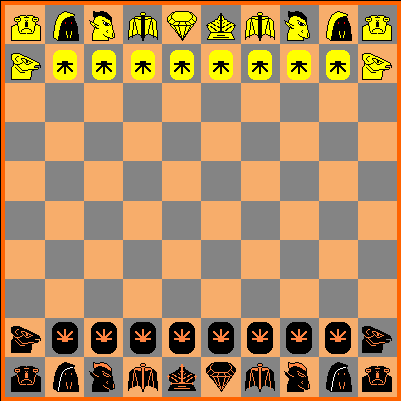The filmmaker Errol Morris: "I've my own personal definition of art, which is: Set up a series of arbitrary rules and then follow them slavishly." (Source.)
As a lifelong player of games (cards, mostly, poker in particular, but I've been enjoying the current chess championships as an observer (never having been the least bit good at playing the game, I did go through an Edgar Rice Burroughs and Martin Gardner-inspired adolescent phase of designing chess variants — boards with alternative geometries, pieces with alternative moves, more than two players in teams and alliances, uneven distributions of pieces and real estate, alternating moves in patterns other than black-white-black-white etc.)), I am fascinated both with the consequences of playing according to a fixed set of rules and with the possible consequences when even the slightest variations in those rules comes into play. There is a real thrill here at the possibility of a single grain of sand moved slightly giving rise to completely different universes. This thrill is aesthetic, and I find it in every piece of music that thrills me.
It used to be the case, in composing, that I would set up my rules in advance of composition and then keep strictly to them. Nowadays, although I believe that I work just as strictly in my pieces, I don't always begin with all the rules laid out in advance. Instead, I let them emerge as problems and possibilities arise and then, deciding on a rule, stick with it. This strikes me as more in line with the way that social and political worlds actually work. Even if you start out with some formal constitutional arrangement, whether minimal or maximal in scope and detail, something is either left out, or gotten completely wrong, or some unforeseen or even completely unimagined configuration arises demanding substantial decisions on the spot. And that process of dynamic decision making, requiring the near-spontaneous articulation or clarification of the problems and possibilities can be a compelling activity in its own right. The presence of a set of rules won't guarantee that a piece (and they certainly don't make a society) will work automatically, indeed at all — and indeed, the most immediate thing a rule may define is often only its violation, not its successful implementation —, but they can create structures and opportunities to make it work with far less anxiety than operating from brute force.
This past year has been one spent more with experimentation, and rule-based experimentation at that, than with producing musical scores with the shiny veneer of the well-finished. For example, I've made a number of small pieces — amateur pieces for friends, most of them not for publication — for solo instruments based on the rhythmic and sonic patterns and structures of poetic forms (sonnets, sapphics, rondeaus, limericks etc.) which have introduced some musically potent new ideas about local and global rules into my music. And yes, the play of composing (as Lou Harrison put it) is very much here as well.


No comments:
Post a Comment